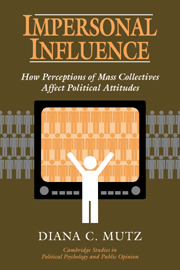Book contents
- Frontmatter
- Contents
- List of Figures
- List of Tables
- Preface
- Acknowledgments
- Part I Theory and Historical Context
- 1 The Generalized Other: Social Influence in Contemporary American Politics
- 2 Beyond Personal Influence: The Rise of Impersonal Associations
- 3 The Origins of Perceptions of Mass Collectives: Mass Media's Role
- Part II Effects of Perceptions of Mass Experience
- Part III Effects of Perceptions of Mass Opinion
- Part IV Conclusion
- Appendix: Methodology
- References
- Index
1 - The Generalized Other: Social Influence in Contemporary American Politics
Published online by Cambridge University Press: 05 June 2012
- Frontmatter
- Contents
- List of Figures
- List of Tables
- Preface
- Acknowledgments
- Part I Theory and Historical Context
- 1 The Generalized Other: Social Influence in Contemporary American Politics
- 2 Beyond Personal Influence: The Rise of Impersonal Associations
- 3 The Origins of Perceptions of Mass Collectives: Mass Media's Role
- Part II Effects of Perceptions of Mass Experience
- Part III Effects of Perceptions of Mass Opinion
- Part IV Conclusion
- Appendix: Methodology
- References
- Index
Summary
Reality … has anyway long ceased to be what it was for my grandmother, who lived in a Moravian village and still knew everything through her own experience: how bread is baked, how a house is built, how a pig is slaughtered and the meat is smoked, what quilts are made of, what the priests and the schoolteacher think about the world; she met the whole village every day and knew how many murders were committed in the country over the last ten years; she had, so to speak, personal control over reality, and nobody could fool her by maintaining that Moravian agriculture was thriving when people at home had nothing to eat. My Paris neighbor spends his time in an office, where he sits for eight hours facing an office colleague, then he sits in his car and drives home, turns on the TV, and when the announcer informs him that in the latest public opinion poll the majority of Frenchmen voted their country the safest in Europe (I recently read such a report), he is overjoyed and opens a bottle of champagne without ever learning that three thefts and two murders were committed on his street that very day. … [S]ince for contemporary man reality is a continent visited less and less often and, besides, justifiably disliked, the findings of polls have become a kind of higher reality, or to put it differently: they have become the truth.
Milan Kundera, Immortality (New York: HarperPerennial, 1991), p. 115- Type
- Chapter
- Information
- Impersonal InfluenceHow Perceptions of Mass Collectives Affect Political Attitudes, pp. 3 - 25Publisher: Cambridge University PressPrint publication year: 1998



